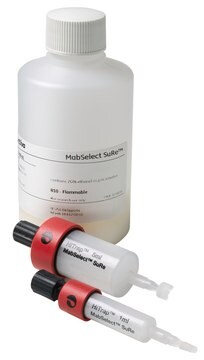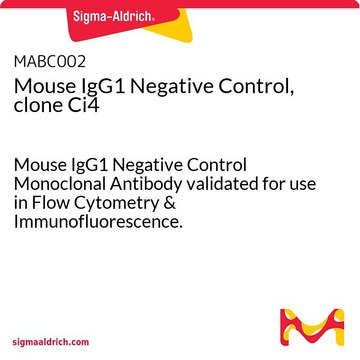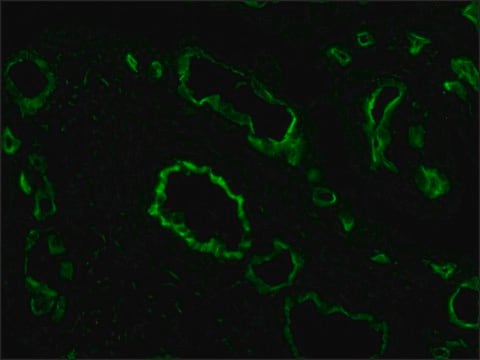MABC006
Mouse IgG2b Negative Control, clone GC198
Mouse IgG2b Negative Control Monoclonal Antibody validated for use in Flow Cytometry & Immunofluorescence.
Iniciar sesiónpara Ver la Fijación de precios por contrato y de la organización
About This Item
Código UNSPSC:
12352203
eCl@ss:
32160702
NACRES:
NA.42
Productos recomendados
origen biológico
mouse
Nivel de calidad
forma del anticuerpo
purified immunoglobulin
clon
GC198, monoclonal
fabricante / nombre comercial
Chemicon®
concentración
0.5 mg/mL
técnicas
flow cytometry: suitable
immunofluorescence: suitable
isotipo
IgG2b
Condiciones de envío
wet ice
modificación del objetivo postraduccional
unmodified
Especificidad
This antibody reacts with the outer membrane protein of some strains of Neisseria gonorrhoeae. No reaction with human cell surface or plasma components has been observed. However, some binding to Fc receptors may occur.
Inmunógeno
Protein I preparation from Neisseria gonorrhoeae.
Aplicación
Mouse IgG2b is a monoclonal antibody intended for use as a negative control in immunofluorescence, flow cytometry, and immunoperoxidase staining on frozen and paraffin tissue sections. Its use enables an estimation of non specific binding of mouse monoclonal antibodies to cell surface components in peripheral blood and tissue.
SUGGESTED USAGE
The control antibody should be diluted to the same concentration as the test antibody, and equivalent volumes used.
SUGGESTED USAGE
The control antibody should be diluted to the same concentration as the test antibody, and equivalent volumes used.
Research Category
Secondary & Control Antibodies
Epitope Tags & General Use
Secondary & Control Antibodies
Epitope Tags & General Use
Research Sub Category
Isotype Control Antibodies
Isotype Control Antibodies
Ligadura / enlace
Replaces: CBL602
Forma física
Format: Purified
Purified immunoglobulin. The antibody is supplied in 0.5ml 25mM Tris-HCl, 0.4M NaCl, pH 8.0, containing 0.2% bovine serum albumin and 0.1% sodium azide. The characteristics of each lot are tested by electrophoresis, specific immunofluorescence assay and flow cytometry.
Almacenamiento y estabilidad
Store at 2 to 8°C, for up to 6 months. For prolonged periods, store below -20°C in undiluted aliquots. AVOID REPEATED FREEZE/THAW CYCLES.
WARNING: The monoclonal reagent solution contains 0.1% sodium azide as a preservative. Due to potential hazards arising from the build up of this material in pipes, spent reagent should be disposed of with liberal volumes of water.
WARNING: The monoclonal reagent solution contains 0.1% sodium azide as a preservative. Due to potential hazards arising from the build up of this material in pipes, spent reagent should be disposed of with liberal volumes of water.
Información legal
CHEMICON is a registered trademark of Merck KGaA, Darmstadt, Germany
Cláusula de descargo de responsabilidad
Unless otherwise stated in our catalog or other company documentation accompanying the product(s), our products are intended for research use only and are not to be used for any other purpose, which includes but is not limited to, unauthorized commercial uses, in vitro diagnostic uses, ex vivo or in vivo therapeutic uses or any type of consumption or application to humans or animals.
Palabra de señalización
Warning
Frases de peligro
Consejos de prudencia
Clasificaciones de peligro
Met. Corr. 1
Código de clase de almacenamiento
8B - Non-combustible corrosive hazardous materials
Clase de riesgo para el agua (WGK)
WGK 2
Punto de inflamabilidad (°F)
Not applicable
Punto de inflamabilidad (°C)
Not applicable
Certificados de análisis (COA)
Busque Certificados de análisis (COA) introduciendo el número de lote del producto. Los números de lote se encuentran en la etiqueta del producto después de las palabras «Lot» o «Batch»
¿Ya tiene este producto?
Encuentre la documentación para los productos que ha comprado recientemente en la Biblioteca de documentos.
Kristina Hopfensperger et al.
mBio, 11(4) (2020-07-16)
HLA-C-mediated antigen presentation induces the killing of human immunodeficiency virus (HIV)-infected CD4+ T cells by cytotoxic T lymphocytes (CTLs). To evade killing, many HIV-1 group M strains decrease HLA-C surface levels using their accessory protein Vpu. However, some HIV-1 group
Wells S Brown et al.
Cell reports. Medicine, 1(8), 100131-100131 (2020-12-10)
Activating KRAS mutations are found in over 90% of pancreatic ductal adenocarcinomas (PDACs), yet KRAS has remained a difficult target to inhibit pharmacologically. Here, we demonstrate, using several human and mouse models of PDACs, rapid acquisition of tumor resistance in
Cole D Libner et al.
The Journal of comparative neurology, 528(10), 1704-1724 (2019-12-25)
Neurodegeneration, including loss of neurons and axons, is a feature of progressive forms of multiple sclerosis (MS). The mechanisms underlying neurodegeneration are mostly unknown. Research implicates autoimmunity to nonmyelin self-antigens as important contributors to disease pathogenesis. Data from our lab
Nuestro equipo de científicos tiene experiencia en todas las áreas de investigación: Ciencias de la vida, Ciencia de los materiales, Síntesis química, Cromatografía, Analítica y muchas otras.
Póngase en contacto con el Servicio técnico

![3-Aminoimidazo[1,2-a]pyridine 97%](/deepweb/assets/sigmaaldrich/product/structures/177/879/133fd1ee-499a-4242-9d3c-406e87ce1d6c/640/133fd1ee-499a-4242-9d3c-406e87ce1d6c.png)







